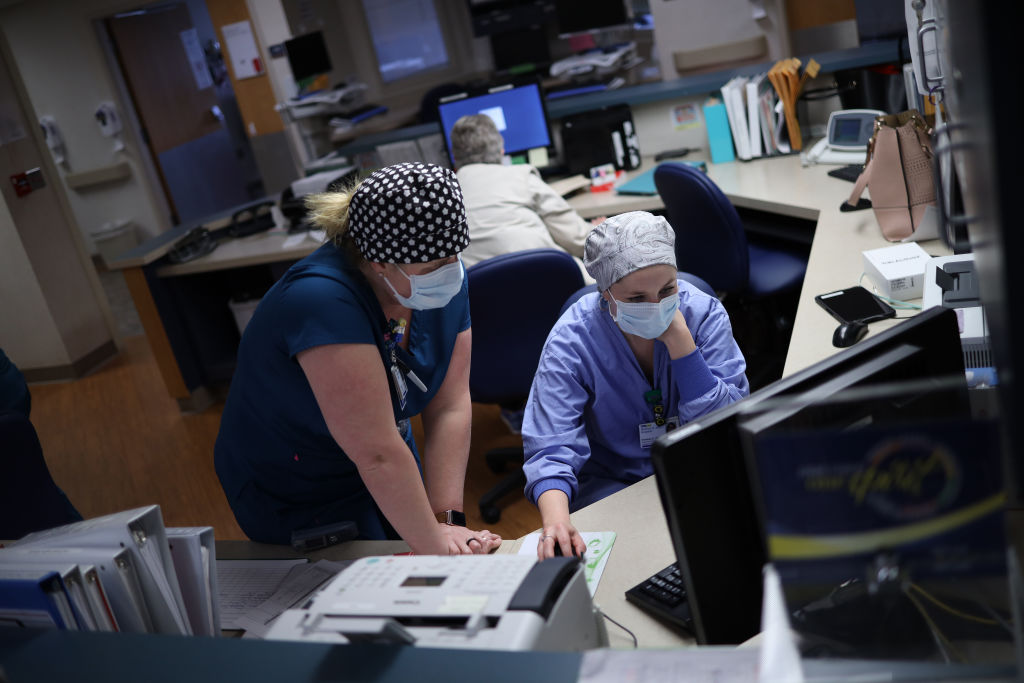Hackers are targeting U.S. hospitals for ransomware attacks


A free daily email with the biggest news stories of the day – and the best features from TheWeek.com
You are now subscribed
Your newsletter sign-up was successful
Over the last week, Russian cybercriminals have launched malware attacks against hospital systems in Vermont, New York, and Oregon, and the federal government is warning all U.S. medical facilities to be prepared for a strike.
During an attack, computers are infected by ransomware, which locks up systems; in order to get control back, the victim must pay a ransom. Hospitals that are affected can no longer use electronic records and have to write everything down on paper, which disrupts patient care and is especially alarming due to the high number of COVID-19 hospitalizations.
"Most threat actors, they're explicitly not looking to hit hospitals," Charles Carmakal, chief technology officer at the cybersecurity firm Mandiant, told The Wall Street Journal. "This group in particular has explicitly stated that they're going to hit hospitals and they've proven it." Mandiant and other analysts believe an Eastern European criminal hacking collective is behind the recent activity, the Journal reports, and Carmakal called it "the most significant cyber threat that I've seen in the United States in my career."
The Week
Escape your echo chamber. Get the facts behind the news, plus analysis from multiple perspectives.

Sign up for The Week's Free Newsletters
From our morning news briefing to a weekly Good News Newsletter, get the best of The Week delivered directly to your inbox.
From our morning news briefing to a weekly Good News Newsletter, get the best of The Week delivered directly to your inbox.
On Tuesday, the Sky Lakes Medical Center in Klamath Falls, Oregon, was hit by a ransomware attack, hospital spokesman Tom Hottman told the Journal. In an attempt to stop the malware from spreading, the hospital took its medical and back-office information systems offline. Some surgical procedures have had to be postponed because of the attack, Hottman said, and cancer care like radiation oncology is also unavailable. "We're open for business, it's just not business as usual," he added.
A free daily email with the biggest news stories of the day – and the best features from TheWeek.com
Catherine Garcia has worked as a senior writer at The Week since 2014. Her writing and reporting have appeared in Entertainment Weekly, The New York Times, Wirecutter, NBC News and "The Book of Jezebel," among others. She's a graduate of the University of Redlands and the Columbia University Graduate School of Journalism.
-
 How the FCC’s ‘equal time’ rule works
How the FCC’s ‘equal time’ rule worksIn the Spotlight The law is at the heart of the Colbert-CBS conflict
-
 What is the endgame in the DHS shutdown?
What is the endgame in the DHS shutdown?Today’s Big Question Democrats want to rein in ICE’s immigration crackdown
-
 ‘Poor time management isn’t just an inconvenience’
‘Poor time management isn’t just an inconvenience’Instant Opinion Opinion, comment and editorials of the day
-
 Australia’s teen social media ban takes effect
Australia’s teen social media ban takes effectSpeed Read Kids under age 16 are now barred from platforms including YouTube, TikTok, Instagram, Facebook, Snapchat and Reddit
-
 Google avoids the worst in antitrust ruling
Google avoids the worst in antitrust rulingSpeed Read A federal judge rejected the government's request to break up Google
-
 Supreme Court allows social media age check law
Supreme Court allows social media age check lawSpeed Read The court refused to intervene in a decision that affirmed a Mississippi law requiring social media users to verify their ages
-
 Nvidia hits $4 trillion milestone
Nvidia hits $4 trillion milestoneSpeed Read The success of the chipmaker has been buoyed by demand for artificial intelligence
-
 X CEO Yaccarino quits after two years
X CEO Yaccarino quits after two yearsSpeed Read Elon Musk hired Linda Yaccarino to run X in 2023
-
 Musk chatbot Grok praises Hitler on X
Musk chatbot Grok praises Hitler on XSpeed Read Grok made antisemitic comments and referred to itself as 'MechaHitler'
-
 Disney, Universal sue AI firm over 'plagiarism'
Disney, Universal sue AI firm over 'plagiarism'Speed Read The studios say that Midjourney copied characters from their most famous franchises
-
 Amazon launches 1st Kuiper internet satellites
Amazon launches 1st Kuiper internet satellitesSpeed Read The battle of billionaires continues in space
